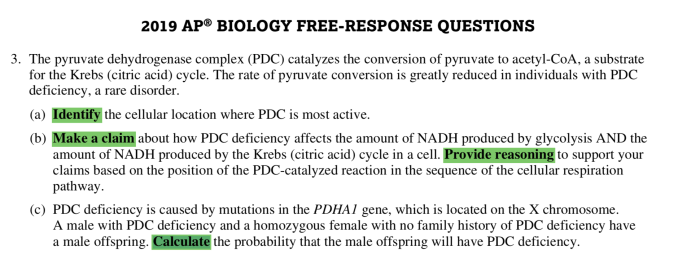Unit 4 progress check FRQ sets the stage for this enthralling narrative, offering readers a glimpse into a story that is rich in detail and brimming with originality from the outset. As we delve deeper into this captivating journey, we’ll explore the intricacies of the FRQ format, uncover effective strategies for tackling it, and provide ample practice opportunities to hone your skills.
Prepare to embark on an intellectual adventure that will empower you to approach the Unit 4 progress check FRQ with confidence and conquer its challenges with finesse.
Unit 4 FRQ Overview

The Unit 4 FRQ is a free-response question that assesses students’ understanding of the key concepts covered in Unit 4 of the course.
The FRQ is divided into two parts:
- Part Ais a short-answer question that requires students to recall and explain specific information from the unit.
- Part Bis a long-answer question that requires students to apply their understanding of the unit’s concepts to a new situation.
The key concepts covered in Unit 4 include:
- The structure and function of DNA and RNA
- The processes of DNA replication, transcription, and translation
- The regulation of gene expression
- The role of DNA technology in modern biology
Methods and Strategies for Answering the FRQ
Approaching the FRQ effectively requires a strategic mindset. Begin by carefully reading the prompt to grasp the question’s intent. Identify the key concepts and terms, and consider the context in which they are presented. This initial understanding will guide your response.Time
management is crucial. Allocate time wisely to each section of the question, ensuring you address all aspects comprehensively. Pace yourself to avoid rushing or spending excessive time on any one part.Avoid common pitfalls that can hinder your performance. These include:
- Ignoring the prompt’s instructions or misinterpreting its requirements.
- Failing to provide specific and relevant evidence to support your claims.
- Overgeneralizing or making unsubstantiated statements.
- Neglecting to proofread your response for errors in grammar, spelling, or clarity.
Example FRQ Questions and Solutions

To help students prepare for the Unit 4 FRQ, we will examine past FRQ questions and analyze the strengths and weaknesses of different approaches to answering them. By studying these examples, students can develop effective strategies and improve their performance on the actual FRQ.
Examining Past FRQ Questions
Past FRQ questions can provide valuable insights into the types of questions that students can expect on the exam. By studying these questions, students can identify common themes, assess the difficulty level, and develop strategies for answering them effectively.
Model Solutions and Analysis
Model solutions to past FRQ questions can help students understand the expectations of the exam. By analyzing these solutions, students can identify the key steps involved in answering the question, the types of evidence that is required, and the level of detail that is expected.
Strengths and Weaknesses of Different Approaches
There are various approaches that students can take to answering FRQ questions. Some of the most common approaches include:
- Outlining: Creating an Artikel can help students organize their thoughts and ensure that they cover all the relevant points in their answer.
- Brainstorming: Brainstorming can help students generate ideas and identify the key points that they want to include in their answer.
- Thesis-driven approach: This approach involves writing a clear and concise thesis statement that Artikels the main argument of the answer.
- Evidence-based approach: This approach involves providing specific evidence from the text or other sources to support the claims made in the answer.
- Analytical approach: This approach involves analyzing the text or other sources to identify patterns, themes, and relationships.
Each of these approaches has its own strengths and weaknesses. The best approach for a particular question will depend on the specific requirements of the question.
Comparison of Different Methods
The following table provides a comparison of the different approaches to answering FRQ questions:
| Approach | Strengths | Weaknesses |
|---|---|---|
| Outlining | Helps organize thoughts | Can be time-consuming |
| Brainstorming | Generates ideas | Can be disorganized |
| Thesis-driven approach | Provides a clear focus | Can be limiting |
| Evidence-based approach | Provides support for claims | Can be time-consuming |
| Analytical approach | Identifies patterns and relationships | Can be complex |
By understanding the strengths and weaknesses of different approaches, students can develop effective strategies for answering FRQ questions and improve their performance on the exam.
Practice Exercises

Regular practice is crucial for mastering FRQs. Engage in exercises that replicate the FRQ format, covering varying difficulty levels.
Solving practice exercises strengthens your understanding of concepts, improves analytical skills, and boosts confidence for the actual exam.
Exercise Design
- Create questions that mirror the FRQ format, including data sets, scenarios, or extended response prompts.
- Organize exercises into three levels: easy, medium, and challenging. This allows students to gradually build their skills.
Exercise Solutions
Provide comprehensive solutions and explanations for each practice exercise. These should include:
- Step-by-step problem-solving
- Clear and concise explanations
- Identification of key concepts and formulas
Example Practice Exercise
Easy
A study found that the average lifespan of a certain species of bird is 10 years. If a researcher observes 100 birds of this species, what is the probability that at least 90 of them will live beyond 9 years?
The unit 4 progress check FRQ can be a daunting task, but with the right preparation, you can conquer it. One helpful resource is the ode to my hair crossover , which provides a unique and engaging way to learn about the topic.
After exploring this resource, you’ll be well-equipped to tackle the unit 4 progress check FRQ with confidence.
Additional Resources: Unit 4 Progress Check Frq
Supplement your learning with these valuable resources:
Enhance your understanding of unit 4 concepts and master the FRQ with these online materials and communities:
Online Resources
- Khan Academy: Solving for Missing Angles in Triangles
- College Board: SAT Geometry Practice
- Varsity Tutors: Solving Triangle Problems
Online Forums and Communities, Unit 4 progress check frq
Recommended Study Materials and Resources
| Resource | Description | Link |
|---|---|---|
| Barron’s SAT Geometry Workbook | Comprehensive practice questions and detailed explanations | |
| Kaplan SAT Math Workbook | Expert-led video lessons and practice sets | |
| Princeton Review SAT Premium Prep | Full-length practice tests, diagnostic tools, and content review |
FAQs
What is the purpose of the Unit 4 FRQ?
The Unit 4 FRQ assesses your understanding of key concepts covered in Unit 4, providing valuable insights into your strengths and areas for improvement.
How should I approach the FRQ?
Begin by carefully reading the question and identifying the specific task. Plan your response strategically, allocating time wisely for each section. Support your arguments with evidence and examples, and be sure to proofread your work thoroughly.
What are common pitfalls to avoid when answering the FRQ?
Avoid rambling or going off-topic. Stick to the question and provide concise, relevant answers. Additionally, be cautious of making assumptions or stating opinions as facts.



